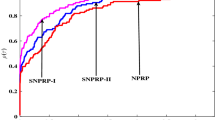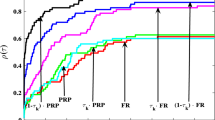Abstract
Two new spectral conjugate gradient methods (ZL1 method and ZL2 method) for solving unconstrained optimization problems are established. Under the standard Wolfe line search, the search direction generated by the ZL1 method is a descent direction. The search direction of the ZL2 method satisfies descent property independent of the line search. The global convergence of the two new methods can be demonstrated under the standard Wolfe line search. Numerical experiments are presented to show that the two methods are effective.

Similar content being viewed by others
References
Hestenes, M.R., Stiefel, E.: Method of conjugate gradient for solving linear equations. J. Res. Natl. Bureau Stand. 49, 409–436 (1952)
Fletcher, R., Reeves, C.M.: Function minimization by conjugate gradients. Comput. J. 7, 149–154 (1964)
Polak, E., Ribiere, G.: Note sur la convergence de méthodes de directions conjugées. Rev. Française Inf. Rech. Oper. 3, 35–43 (1969)
Polyak, B.T.: The conjugate gradient method in extreme problems. USSR. Comput. Math. Math. Phys. 9, 94–112 (1969)
Fletcher, R.: Practical method of optimization, vol I unconstrained optimization. Wiley, NewYork (1987)
Liu, Y., Storey, C.: Efficient generalized conjugate gradient algorithms, part I theory. J. Optim. Theory Appl. 69, 129–137 (1991)
Dai, Y.H., Yuan, Y.: A three-parameter family of nonlinear conjugate gradient methods. Math. Comp. 70, 1155–1167 (2001)
Zhang, L., Zhou, W.J., Li, D.H.: Global convergence of a modified Fletcher-Reeves conjugate gradient method with Armijo-type line search. Numer. Math. 104, 561–572 (2006)
Zhang, L., Zhou, W.J., Li, D.H.: A descent modified Polak-Ribière-Polyak conjugate gradient method and its global convergence. IMA J. Numer. Anal. 26, 629–640 (2006)
Andrei, N.: New accelerated conjugate gradient algorithms as a modification of Dai-Yuans computational scheme for unconstrained optimization. J. Comput. Appl. Math. 234, 3397–3410 (2010)
Sun, M., Liu, J.: Three modified Polak-Ribiere-Polyak conjugate gradient methods with sufficient descent property. IMA J. Numer. Anal. 2015, 125–129 (2015)
Jiang, X.Z., Jian, J.B.: Improved Fletcher-Reeves and Dai-Yuan conjugate gradient methods with the strong Wolfe line search. J. Comput. Appl. Math. 348, 525–534 (2019)
Dong, X.L.: A modified nonlinear Polak-Ribière-Polyak conjugate gradient method with sufficient descent property. Calcolo. 57, 1–14 (2020)
Zhu, Z.B., Zhang, D.D., Wang, S.: Two modified DY conjugate gradient methods for unconstrained optimization problems. Appl. Math. Comput. 373, 1–10 (2020)
Birgin, E.G., Martínez, J.M.: A spectral conjugate gradient method for unconstrained optimization. Appl. Math. Optim. 43, 117–128 (2001)
Awwal, A.M., Sulaiman, I.M., Malik, M., et al.: A spectral RMIL+ conjugate gradient method for unconstrained optimization with applications in portfolio selection and motion control. IEEE Access. 9, 75398–75414 (2021)
Aji, S., Kumam, P., Awwal, A.M., et al.: An efficient DY-type spectral conjugate gradient method for system of nonlinear monotone equations with application in signal recovery. Aims Math. 6(8), 8078–8106 (2021)
Hu, P., Du, X.W., Guo, C.F.: Global convergence of a modified LS spectral conjugate gradient method. J. Chongqing Normal Univ. (Nat. Sci.) 29, 13–15 (2012)
Lin, S.H.: Global convergence of two spectral conjugate gradient methods for unconstrained optimization. J. Chongqing Normal Univ. (Nat. Sci.) 32, 1–6 (2015)
**a, L.N., Zhu, Z.B.: Two modified FR spectral conjugate gradient methods under wolfe line search. Math. Appl. 34, 647–656 (2021)
Andrei, N.: An unconstrained optimization test functions collection. Adv. Model. Optim. 10, 147–161 (2008)
Dolan, E.D., Moré, J.J.: Benchmarking optimization software with performance profiles. Math. Program. 91, 201–213 (2002)
Author information
Authors and Affiliations
Corresponding author
Additional information
Publisher's Note
Springer Nature remains neutral with regard to jurisdictional claims in published maps and institutional affiliations.
This work is supported by the National Natural Science Foundation of China (61967004, 11901137), Guangxi Key Laboratory of Cryptography and Information Security (GCIS201927, GCIS201621) and Guangxi Key Laboratory of Automatic Detecting Technology and Instruments (YQ20113, YQ20114)
Rights and permissions
About this article
Cite this article
Zhu, Z., Long, A. & Wang, T. Two spectral conjugate gradient methods for unconstrained optimization problems. J. Appl. Math. Comput. 68, 4821–4841 (2022). https://doi.org/10.1007/s12190-022-01730-1
Received:
Revised:
Accepted:
Published:
Issue Date:
DOI: https://doi.org/10.1007/s12190-022-01730-1




